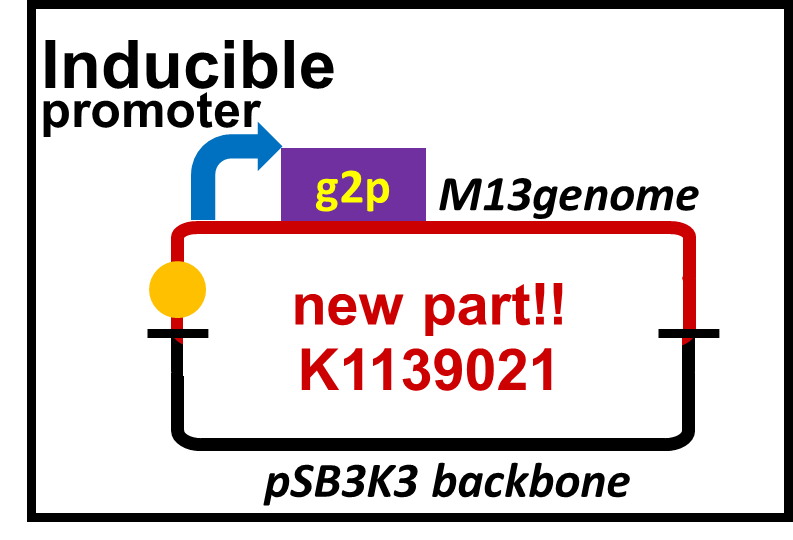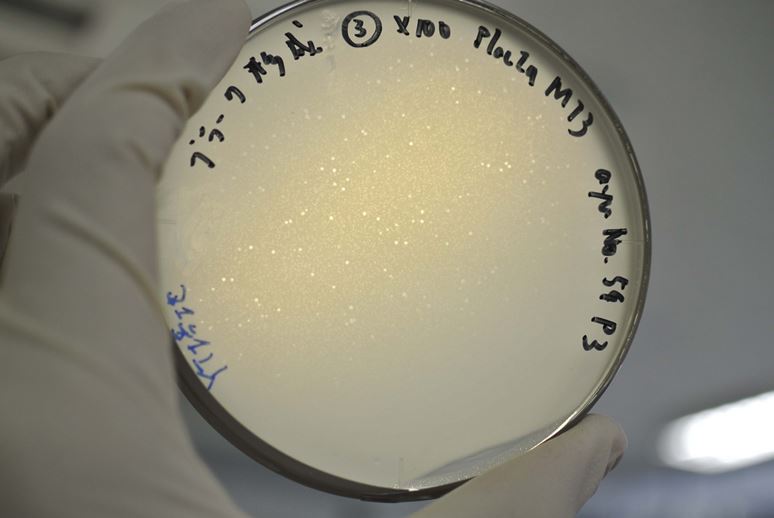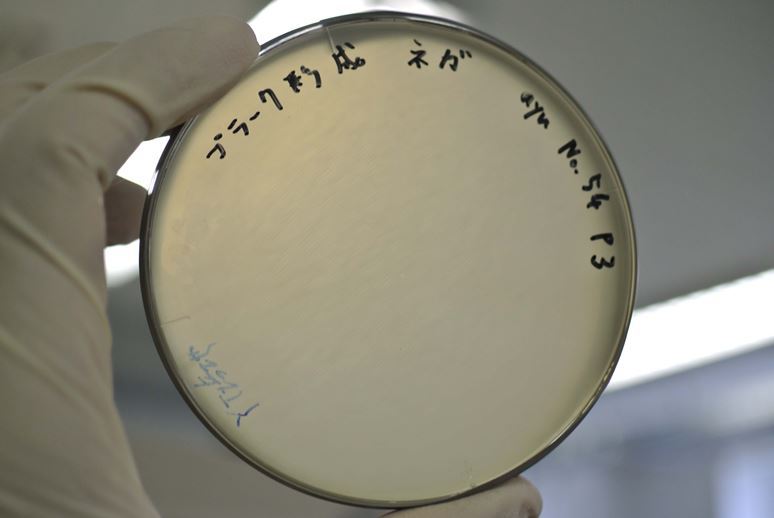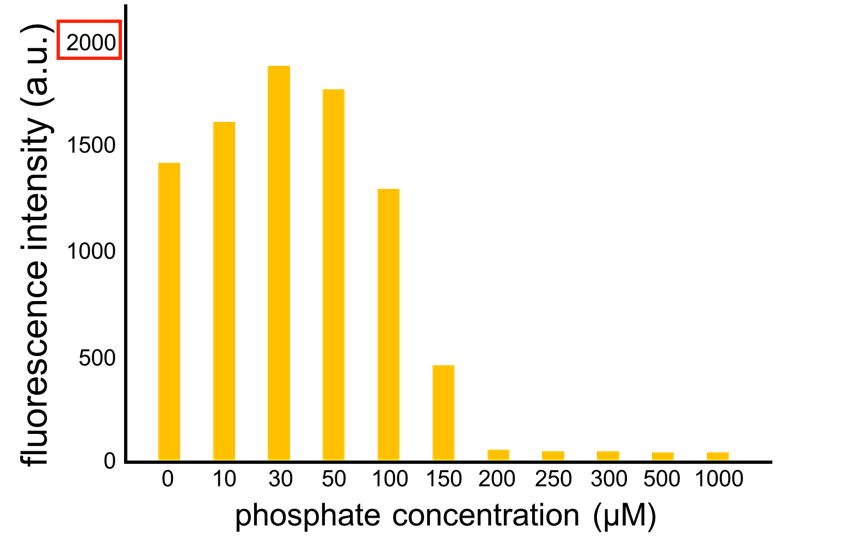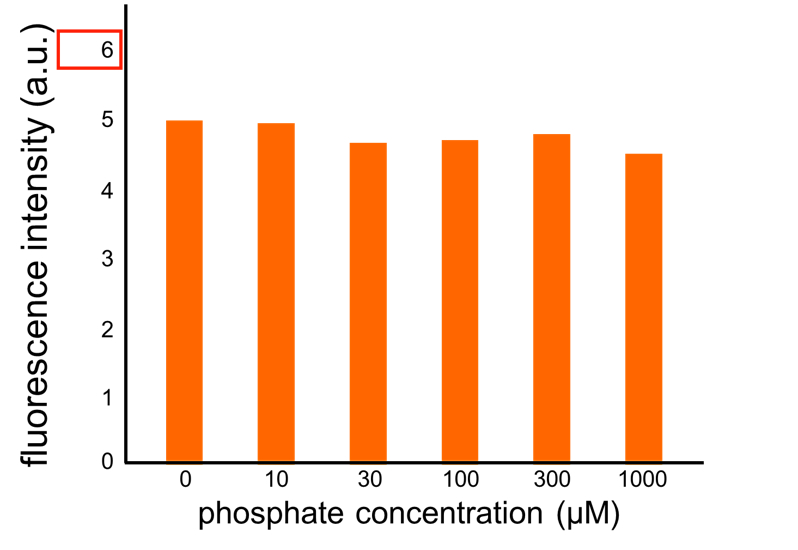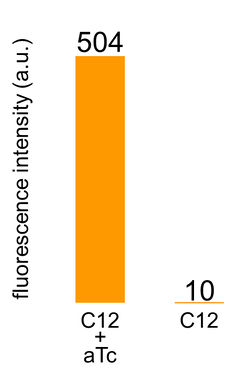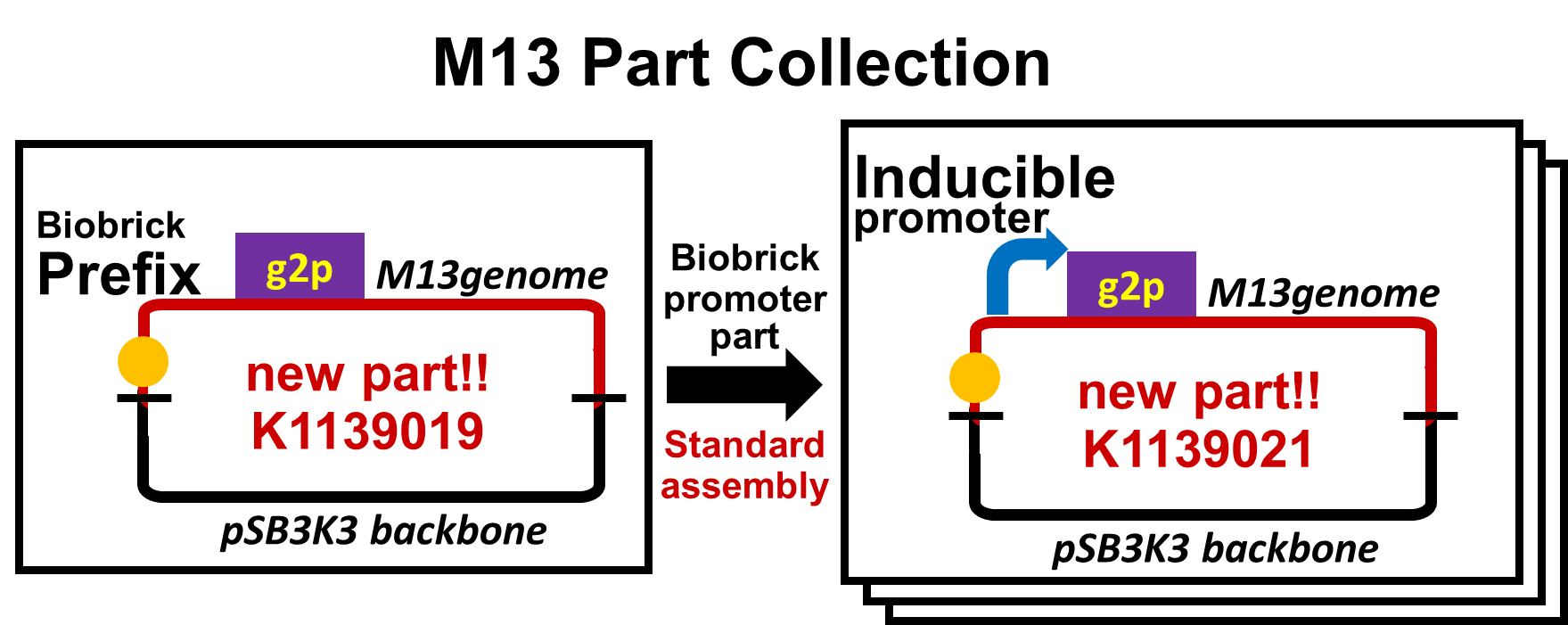Team:Tokyo Tech/Submitted Parts
From 2013.igem.org
| (36 intermediate revisions not shown) | |||
| Line 2: | Line 2: | ||
<div id="text-area"><br> | <div id="text-area"><br> | ||
<div class="box" id="title"> | <div class="box" id="title"> | ||
| - | <p style="line-height:0em; text-indent:0em;">Parts submitted to the Registry</p> | + | <p style="line-height:0em; text-indent:0em;" name="top">Parts submitted to the Registry</p> |
</div> | </div> | ||
<div class="box" id="abstract"> | <div class="box" id="abstract"> | ||
| - | <h2>For a brief overview of our main results, please have a look at our Main Results page. [https://2013.igem.org/Team:Tokyo_Tech Go to | + | <h2>For a brief overview of our main results, please have a look at our Main Results page. |
| - | <h3>Favorite | + | <div align="right">[https://2013.igem.org/Team:Tokyo_Tech (Go to Home)]</div> |
| + | </h2> | ||
| + | <h3>Favorite Tokyo Tech 2013 iGEM Team Parts | ||
| + | </h3> | ||
<div align="center"> | <div align="center"> | ||
{| class="wikitable" cellpadding="6" | {| class="wikitable" cellpadding="6" | ||
| Line 16: | Line 19: | ||
| align="center" style="background:#f0f0f0;"|'''Length''' | | align="center" style="background:#f0f0f0;"|'''Length''' | ||
|- | |- | ||
| - | |W||[http://parts.igem.org/Part:BBa_K1139021 BBa_K1139021]||Composite||Plux-M13-Plac-GFP||Naoki Watarai||7705 | + | |W||[http://parts.igem.org/Part:BBa_K1139021 BBa_K1139021]||Composite||Plux-M13-Plac-<i>GFP</i>||Naoki Watarai||7705 |
|- | |- | ||
| - | |W||[http://parts.igem.org/Part:BBa_K1139110 BBa_K1139110]||Composite||Pcon-LasR-Plux/tet-GFP||Naoki Watarai||1888 | + | |W||[http://parts.igem.org/Part:BBa_K1139110 BBa_K1139110]||Composite||Pcon-<i>LasR</i>-Plux/tet-<i>GFP</i>||Naoki Watarai||1888 |
|- | |- | ||
| - | |W||[http://parts.igem.org/Part:BBa_K1139201 BBa_K1139201]||Measurement||PphoA-GFP-TT||Sara Ogino||1017 | + | |W||[http://parts.igem.org/Part:BBa_K1139201 BBa_K1139201]||Measurement||PphoA-<i>GFP</i>-TT||Sara Ogino||1017 |
|} | |} | ||
</div> | </div> | ||
| - | <h3> | + | <h3>Tokyo Tech 2013 iGEM Team Parts |
| + | </h3> | ||
<div align="center"> | <div align="center"> | ||
{| class="wikitable" cellpadding="6" | {| class="wikitable" cellpadding="6" | ||
| Line 33: | Line 37: | ||
| align="center" style="background:#f0f0f0;"|'''Length''' | | align="center" style="background:#f0f0f0;"|'''Length''' | ||
|- | |- | ||
| - | |||[http://parts.igem.org/Part:BBa_K1139019 BBa_K1139019]||Composite||Promoterless-M13||Naoki Watarai||6400 | + | |W||[http://parts.igem.org/Part:BBa_K1139019 BBa_K1139019]||Composite||Promoterless-M13||Naoki Watarai||6400 |
|- | |- | ||
| - | |W||[http://parts.igem.org/Part:BBa_K1139020 BBa_K1139020]||Composite|| | + | |W||[http://parts.igem.org/Part:BBa_K1139020 BBa_K1139020]||Composite||PlacI<sup>q</sup>-M13-Plac-<i>GFP</i>||Naoki Watarai||7406 |
|- | |- | ||
| - | |||[http://parts.igem.org/Part:BBa_K1139150 BBa_K1139150]||Measurement|| | + | |W||[http://parts.igem.org/Part:BBa_K1139022 BBa_K1139022]||Composite||Promoterless-M13-Plac-<i>GFP</i>||Naoki Watarai||7363 |
| + | |- | ||
| + | |||[http://parts.igem.org/Part:BBa_K1139023 BBa_K1139023]||Composite||Ptet-M13||Shinya Suzuki||6462 | ||
| + | |- | ||
| + | |||[http://parts.igem.org/Part:BBa_K11391025 BBa_K1139025]||Composite||Pbad-M13||Shinya Suzuki||6538 | ||
| + | |- | ||
| + | |W||[http://parts.igem.org/Part:BBa_K1139026 BBa_K1139026]||Composite||Pbad-M13-Plac-<i>GFP</i>||Shinya Suzuki||7501 | ||
| + | |- | ||
| + | |W||[http://parts.igem.org/Part:BBa_K1139150 BBa_K1139150]||Measurement||Prm/lac-<i>GFP</i>-TT||Naoki Watarai||1032 | ||
|} | |} | ||
</div> | </div> | ||
| Line 44: | Line 56: | ||
<h2> | <h2> | ||
<p> | <p> | ||
| - | M13 is a | + | M13 is a non-litic phage that infects only F+ strains of <i>E. coli</i>, which does not kill the host cell. This BioBrick part is extracted from M13mp18 phage vector by PCR. It includes 11 ORFs, M13 origin, a packaging sequence and <i>lac</i> promoter. The promoter upstream of <i>g2p</i> (gene 2 protein) is altered to <i>lux</i> promoter. A phage particle is formed only when the host cell receives AHL signal (3OC6HSL, C6) because G2p (gene 2 protein) is an endonuclease which is needed for a plasmid to be replicated by M13 origin, and to be packaged into the phage particle. As a reporter, <i>GFP</i> is inserted downstream of the <i>lac</i> promoter. |
</p> | </p> | ||
</h2> | </h2> | ||
<br> | <br> | ||
| - | <h3>Best new BioBrick part (natural): [http://parts.igem.org/Part:BBa_K1139020 BBa_K1139020]</h3> | + | <h3>Best new BioBrick part (natural): [http://parts.igem.org/Part:BBa_K1139020 BBa_K1139020] |
| + | </h3> | ||
<h2> | <h2> | ||
<p> | <p> | ||
| - | We confirmed that M13 | + | We confirmed that M13 phage genes and M13 origin worked properly with pSB origin, using a plaque forming assay. One is replacement of the promoter for upstream of g2p with a constitutive promoter, PlacI<sup>q</sup> ([http://parts.igem.org/Part:BBa_I14032 BBa_I14032]). The other is accommodation of pSB3K3 backbone. Even though the plasmid has two different types of replication origins, M13 origin and pSB3 origin, this plasmid ([http://parts.igem.org/Part:BBa_K1139020 BBa_K1139020], Fig. 5-1-2) formed plaque. In contrast, construction intermediates without a promoter for <i>g2p</i> coding sequence (Promoterless-M13 + Plac, Promoterless-M13 + Plac-<i>GFP</i> [http://parts.igem.org/Part:BBa_K1139022 BBa_K1139022], Fig. 5-1-3) could not form plaque.<br> |
</p> | </p> | ||
</h2> | </h2> | ||
| - | <gallery widths=" | + | <gallery widths="350px" heights="250px" style="margin-left:auto; margin-right:auto; text-align:center;"> |
| - | Image:Titech2013_Submitted_Parts_Fig_5-1-2_K1139020_A.jpg|Fig. 5-1-2. | + | Image:Titech2013_Submitted_Parts_Fig_5-1-2_K1139020_A.jpg|Fig. 5-1-2. PlacI<sup>q</sup>-M13-Plac-<i>GFP</i> on pSB3 ([http://parts.igem.org/Part:BBa_K1139020 BBa_K1139020]) |
| - | Image:Titech2013_Submitted_Parts_Fig_5-1-3_K1139020_B.jpg|Fig. 5-1-3. Promoterless-M13-Plac-GFP on pSB3 ([http://parts.igem.org/Part:BBa_K1139022 BBa_K1139022]) | + | Image:Titech2013_Submitted_Parts_Fig_5-1-3_K1139020_B.jpg|Fig. 5-1-3. Promoterless-M13-Plac-<i>GFP</i> on pSB3 ([http://parts.igem.org/Part:BBa_K1139022 BBa_K1139022]) |
</gallery> | </gallery> | ||
<br> | <br> | ||
<h3>Best improved part and Best new BioBrick part (natural): | <h3>Best improved part and Best new BioBrick part (natural): | ||
</h3> | </h3> | ||
| - | <h3>[http://parts.igem.org/Part:BBa_K1139201 BBa_K1139201]</h3> | + | <h3>[http://parts.igem.org/Part:BBa_K1139201 BBa_K1139201] |
| + | </h3> | ||
<h2> | <h2> | ||
<p> | <p> | ||
| - | We improved a phosphate sensor part since the existing phosphate sensor part (OUC-China 2012, [http://parts.igem.org/Part:BBa_K737024 BBa_K737024]) did not have sufficient data. We constructed this part by amplifying the <i>phoA</i> promoter | + | We improved a phosphate sensor part since the existing phosphate sensor part (OUC-China 2012, [http://parts.igem.org/Part:BBa_K737024 BBa_K737024]) did not have sufficient data. We constructed this part by amplifying the <i>phoA</i> promoter from <i>E. coli</i> (MG1655) and ligating it upstream of <i>GFP</i> part. |
| - | Compared to OUC-China’s phosphate sensor part including <i>phoB</i> promoter (Fig. 5-1-5), our phosphate sensor part shows clearer result (Fig. 5-1-4). | + | Compared to OUC-China’s phosphate sensor part including <i>phoB</i> promoter (Fig. 5-1-5), our phosphate sensor part shows a clearer result (Fig. 5-1-4). |
| + | </p> | ||
| + | <p> | ||
| + | A sensor of phosphate concentration is valuable for various studies in synthetic biology. Therefore, our improved part will be useful. | ||
</p> | </p> | ||
</h2> | </h2> | ||
| - | <gallery widths=" | + | <gallery widths="350px" heights="250rx" style="margin-left:auto; margin-right:auto; text-align: center;"> |
| - | Image: Titech2013_Submitted_Parts_Fig_5-1-4_K1139201_A.png|Fig. 5-1-4. Our <i>phoA</i> promoter | + | Image: Titech2013_Submitted_Parts_Fig_5-1-4_K1139201_A.png|Fig. 5-1-4. Our assay results for our <i>phoA</i> promoter |
| - | Image:Titech2013_Submitted_Parts_Fig_5-1-5_K1139201_B.png |Fig. 5-1-5. OUC-China 2012's <i>phoB</i> promoter | + | Image:Titech2013_Submitted_Parts_Fig_5-1-5_K1139201_B.png |Fig. 5-1-5. Our assay results for OUC-China 2012's <i>phoB</i> promoter |
</gallery> | </gallery> | ||
| + | (Note that the scales of the vertical axis are different between the two results) | ||
<br><h2> | <br><h2> | ||
[[Image:Titech2013_Submitted_Parts_Fig_5-1-6_K1139110.jpg|200px|thumb|right|Fig. 5-1-6. The result of crosstalk circumvention]] | [[Image:Titech2013_Submitted_Parts_Fig_5-1-6_K1139110.jpg|200px|thumb|right|Fig. 5-1-6. The result of crosstalk circumvention]] | ||
</h2> | </h2> | ||
| - | <h3>Best new BioBrick part (engineered): [http://parts.igem.org/Part:BBa_K1139110 BBa_K1139110]</h3> | + | <br><br><br> |
| + | <h3>Best new BioBrick part (engineered): [http://parts.igem.org/Part:BBa_K1139110 BBa_K1139110] | ||
| + | </h3> | ||
<h2> | <h2> | ||
<p> | <p> | ||
| - | We constructed [http://parts.igem.org/Part:BBa_K1139110 BBa_K1139110] by combining Pcon-lasR ([http://parts.igem.org/Part:BBa_K553003 BBa_K553003]) and Plux/tet-GFP ([http://parts.igem.org/Part:BBa_K934025 BBa_K934025]). This is the first | + | We constructed [http://parts.igem.org/Part:BBa_K1139110 BBa_K1139110] by combining Pcon-lasR ([http://parts.igem.org/Part:BBa_K553003 BBa_K553003]) and Plux/tet-<i>GFP</i> ([http://parts.igem.org/Part:BBa_K934025 BBa_K934025]). This is the first BioBrick part that succeeded in confirming the circumvention of crosstalk between 3OC12HSL-LasR complex and <i>lux</i> promoter. Using this part with plasmid that is constitutively expressing <i>luxR</i> and <i>tetR</i>, we succeeded in confirming the circumvention of crosstalk LasR to <i>lux</i> promoter. To know more about crosstalk circumvention assay, please see <font size="5">[https://2013.igem.org/Team:Tokyo_Tech/Experiment/Crosstalk_Circumvention_Assay#1._Introduction here]</font>. |
</p> | </p> | ||
</h2> | </h2> | ||
| - | <br><br><br><br> | + | <br><br><br><br><br><br> |
</div><br> | </div><br> | ||
| + | <div class="box"> | ||
| + | <html><a name="parts_collection" href="javascript:noid()"> </a></html> | ||
| + | <h1>Best Part Collection</h1> | ||
| + | <h3>[http://parts.igem.org/Part:BBa_K1139019 BBa_1139019], [http://parts.igem.org/Part:BBa_K1139020 BBa_1139020], [http://parts.igem.org/Part:BBa_K1139021 BBa_1139021], [http://parts.igem.org/Part:BBa_K1139022 BBa_1139022], [http://parts.igem.org/Part:BBa_K1139023 BBa_1139023], [http://parts.igem.org/Part:BBa_K1139025 BBa_1139025], [http://parts.igem.org/Part:BBa_K1139026 BBa_1139026] | ||
| + | </h3> | ||
| + | <h2><p> | ||
| + | We have constructed a series of parts, [http://parts.igem.org/Part:BBa_K1139019 BBa_1139019], [http://parts.igem.org/Part:BBa_K1139020 BBa_1139020], [http://parts.igem.org/Part:BBa_K1139021 BBa_1139021], [http://parts.igem.org/Part:BBa_K1139022 BBa_1139022], [http://parts.igem.org/Part:BBa_K1139023 BBa_1139023], [http://parts.igem.org/Part:BBa_K1139025 BBa_1139025] and [http://parts.igem.org/Part:BBa_K1139026 BBa_1139026]. [http://parts.igem.org/Part:BBa_K1139022 BBa_1139022] is constructed from [http://parts.igem.org/Part:BBa_K1139019 BBa_1139019]. [http://parts.igem.org/Part:BBa_K1139020 BBa_1139020] has a constitutive promoter upstream of [http://parts.igem.org/Part:BBa_K1139022 BBa_1139022]. [http://parts.igem.org/Part:BBa_K1139023 BBa_1139023] and [http://parts.igem.org/Part:BBa_K1139025 BBa_1139025] have an inducible promoter upstream of [http://parts.igem.org/Part:BBa_K1139019 BBa_1139019]. Moreover, [http://parts.igem.org/Part:BBa_K1139021 BBa_1139021] and [http://parts.igem.org/Part:BBa_K1139026 BBa_1139026] have an inducible promoter upstream of [http://parts.igem.org/Part:BBa_K1139022 BBa_1139022].These three parts are confirmed to work accurately in our circuits and are expected to enable DNA messaging. <big>You would be able to transmit desired DNA to the desired place by using our parts.</big> | ||
| + | </p></h2> | ||
| + | [[Image:Titech2013_m13_Fig_2-2-6.png|700px|thumb|center|Fig. 5-1-7. Our M13 part collection]] | ||
| + | </div> | ||
| + | <html><div align="center"><a href="https://2013.igem.org/Team:Tokyo_Tech/Submitted_Parts#top"><img src="https://static.igem.org/mediawiki/2013/f/f0/Titeh2013_backtotop.png" width="200px"></a></div></html> | ||
</div> | </div> | ||
Latest revision as of 03:37, 29 October 2013
Parts submitted to the Registry
For a brief overview of our main results, please have a look at our Main Results page.
Favorite Tokyo Tech 2013 iGEM Team Parts
| Name | Type | Description | Designer | Length | |
| W | [http://parts.igem.org/Part:BBa_K1139021 BBa_K1139021] | Composite | Plux-M13-Plac-GFP | Naoki Watarai | 7705 |
| W | [http://parts.igem.org/Part:BBa_K1139110 BBa_K1139110] | Composite | Pcon-LasR-Plux/tet-GFP | Naoki Watarai | 1888 |
| W | [http://parts.igem.org/Part:BBa_K1139201 BBa_K1139201] | Measurement | PphoA-GFP-TT | Sara Ogino | 1017 |
Tokyo Tech 2013 iGEM Team Parts
| Name | Type | Description | Designer | Length | |
| W | [http://parts.igem.org/Part:BBa_K1139019 BBa_K1139019] | Composite | Promoterless-M13 | Naoki Watarai | 6400 |
| W | [http://parts.igem.org/Part:BBa_K1139020 BBa_K1139020] | Composite | PlacIq-M13-Plac-GFP | Naoki Watarai | 7406 |
| W | [http://parts.igem.org/Part:BBa_K1139022 BBa_K1139022] | Composite | Promoterless-M13-Plac-GFP | Naoki Watarai | 7363 |
| [http://parts.igem.org/Part:BBa_K1139023 BBa_K1139023] | Composite | Ptet-M13 | Shinya Suzuki | 6462 | |
| [http://parts.igem.org/Part:BBa_K11391025 BBa_K1139025] | Composite | Pbad-M13 | Shinya Suzuki | 6538 | |
| W | [http://parts.igem.org/Part:BBa_K1139026 BBa_K1139026] | Composite | Pbad-M13-Plac-GFP | Shinya Suzuki | 7501 |
| W | [http://parts.igem.org/Part:BBa_K1139150 BBa_K1139150] | Measurement | Prm/lac-GFP-TT | Naoki Watarai | 1032 |
Best new BioBrick part (natural and engineered): [http://parts.igem.org/Part:BBa_K1139021 BBa_K1139021]
M13 is a non-litic phage that infects only F+ strains of E. coli, which does not kill the host cell. This BioBrick part is extracted from M13mp18 phage vector by PCR. It includes 11 ORFs, M13 origin, a packaging sequence and lac promoter. The promoter upstream of g2p (gene 2 protein) is altered to lux promoter. A phage particle is formed only when the host cell receives AHL signal (3OC6HSL, C6) because G2p (gene 2 protein) is an endonuclease which is needed for a plasmid to be replicated by M13 origin, and to be packaged into the phage particle. As a reporter, GFP is inserted downstream of the lac promoter.
Best new BioBrick part (natural): [http://parts.igem.org/Part:BBa_K1139020 BBa_K1139020]
We confirmed that M13 phage genes and M13 origin worked properly with pSB origin, using a plaque forming assay. One is replacement of the promoter for upstream of g2p with a constitutive promoter, PlacIq ([http://parts.igem.org/Part:BBa_I14032 BBa_I14032]). The other is accommodation of pSB3K3 backbone. Even though the plasmid has two different types of replication origins, M13 origin and pSB3 origin, this plasmid ([http://parts.igem.org/Part:BBa_K1139020 BBa_K1139020], Fig. 5-1-2) formed plaque. In contrast, construction intermediates without a promoter for g2p coding sequence (Promoterless-M13 + Plac, Promoterless-M13 + Plac-GFP [http://parts.igem.org/Part:BBa_K1139022 BBa_K1139022], Fig. 5-1-3) could not form plaque.
Best improved part and Best new BioBrick part (natural):
[http://parts.igem.org/Part:BBa_K1139201 BBa_K1139201]
We improved a phosphate sensor part since the existing phosphate sensor part (OUC-China 2012, [http://parts.igem.org/Part:BBa_K737024 BBa_K737024]) did not have sufficient data. We constructed this part by amplifying the phoA promoter from E. coli (MG1655) and ligating it upstream of GFP part. Compared to OUC-China’s phosphate sensor part including phoB promoter (Fig. 5-1-5), our phosphate sensor part shows a clearer result (Fig. 5-1-4).
A sensor of phosphate concentration is valuable for various studies in synthetic biology. Therefore, our improved part will be useful.
(Note that the scales of the vertical axis are different between the two results)
Best new BioBrick part (engineered): [http://parts.igem.org/Part:BBa_K1139110 BBa_K1139110]
We constructed [http://parts.igem.org/Part:BBa_K1139110 BBa_K1139110] by combining Pcon-lasR ([http://parts.igem.org/Part:BBa_K553003 BBa_K553003]) and Plux/tet-GFP ([http://parts.igem.org/Part:BBa_K934025 BBa_K934025]). This is the first BioBrick part that succeeded in confirming the circumvention of crosstalk between 3OC12HSL-LasR complex and lux promoter. Using this part with plasmid that is constitutively expressing luxR and tetR, we succeeded in confirming the circumvention of crosstalk LasR to lux promoter. To know more about crosstalk circumvention assay, please see here.
Best Part Collection
[http://parts.igem.org/Part:BBa_K1139019 BBa_1139019], [http://parts.igem.org/Part:BBa_K1139020 BBa_1139020], [http://parts.igem.org/Part:BBa_K1139021 BBa_1139021], [http://parts.igem.org/Part:BBa_K1139022 BBa_1139022], [http://parts.igem.org/Part:BBa_K1139023 BBa_1139023], [http://parts.igem.org/Part:BBa_K1139025 BBa_1139025], [http://parts.igem.org/Part:BBa_K1139026 BBa_1139026]
We have constructed a series of parts, [http://parts.igem.org/Part:BBa_K1139019 BBa_1139019], [http://parts.igem.org/Part:BBa_K1139020 BBa_1139020], [http://parts.igem.org/Part:BBa_K1139021 BBa_1139021], [http://parts.igem.org/Part:BBa_K1139022 BBa_1139022], [http://parts.igem.org/Part:BBa_K1139023 BBa_1139023], [http://parts.igem.org/Part:BBa_K1139025 BBa_1139025] and [http://parts.igem.org/Part:BBa_K1139026 BBa_1139026]. [http://parts.igem.org/Part:BBa_K1139022 BBa_1139022] is constructed from [http://parts.igem.org/Part:BBa_K1139019 BBa_1139019]. [http://parts.igem.org/Part:BBa_K1139020 BBa_1139020] has a constitutive promoter upstream of [http://parts.igem.org/Part:BBa_K1139022 BBa_1139022]. [http://parts.igem.org/Part:BBa_K1139023 BBa_1139023] and [http://parts.igem.org/Part:BBa_K1139025 BBa_1139025] have an inducible promoter upstream of [http://parts.igem.org/Part:BBa_K1139019 BBa_1139019]. Moreover, [http://parts.igem.org/Part:BBa_K1139021 BBa_1139021] and [http://parts.igem.org/Part:BBa_K1139026 BBa_1139026] have an inducible promoter upstream of [http://parts.igem.org/Part:BBa_K1139022 BBa_1139022].These three parts are confirmed to work accurately in our circuits and are expected to enable DNA messaging. You would be able to transmit desired DNA to the desired place by using our parts.
 "
"


